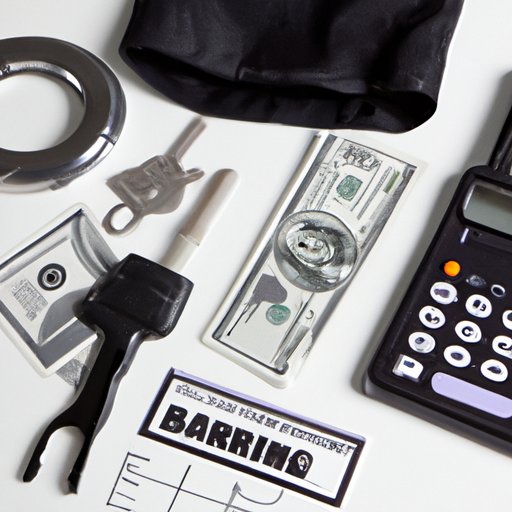Introduction
Bounty hunting is an exciting profession that involves tracking down and apprehending fugitives in exchange for a monetary reward. It’s a job that requires physical and mental strength, as well as a thorough understanding of the law. In this article, we’ll explore the necessary skills and qualifications for bounty hunting, the types of jobs available, legal issues related to bounty hunting, steps to becoming a licensed bounty hunter, safety precautions and equipment needed, and stories from experienced bounty hunters.

Types of Bounty Hunting Jobs Available
The most common type of bounty hunting job is known as fugitive recovery. This involves tracking down individuals who have skipped out on their bail and returning them to custody so they can stand trial. Bail enforcement agents typically receive a percentage of the total bail amount for each fugitive they return. In some cases, they may also receive a bonus if the fugitive is returned within a certain time frame.
Another type of bounty hunting job is bail enforcement. This involves tracking down individuals who have violated the terms of their release and returning them to custody. Bail enforcement agents are typically hired by bail bondsmen or insurance companies to ensure that defendants appear in court and adhere to the conditions of their release. They may also be called upon to investigate potential violations of probation or parole.
Finally, some bounty hunters specialize in private investigation. They use their investigative skills to uncover evidence in criminal cases and assist attorneys with their legal research. Private investigators may also be hired to investigate civil disputes such as child custody battles or insurance fraud.

Legal Issues Related to Bounty Hunting
Before embarking on a career as a bounty hunter, it’s important to understand the legal issues surrounding this profession. Laws vary from state to state regarding the pursuit of fugitives, and bounty hunters must adhere to these regulations at all times. In some states, bounty hunters are allowed to pursue fugitives across state lines, while in others they must remain within the confines of the jurisdiction where the fugitive was initially released.
In addition, laws regarding the arrest and detention of criminals vary from state to state. In some states, bounty hunters are allowed to detain fugitives until they can be transferred to law enforcement, while in others they are not allowed to make arrests. It’s important to familiarize yourself with the laws in your area before attempting any type of bounty hunting.
Finally, state-by-state regulations regarding the licensing and certification of bounty hunters also vary. In some states, bounty hunters must obtain a license in order to legally operate, while in others they may be exempt from this requirement. It’s important to research the regulations in your area before attempting any type of bounty hunting.

Steps to Becoming a Licensed Bounty Hunter
In order to become a licensed bounty hunter, you must first obtain proper certification or licensing. Depending on the state where you live, this may involve taking a training course, passing an exam, or both. Many states also require bounty hunters to complete continuing education courses in order to maintain their license.
In addition, most states require bounty hunters to carry liability insurance in case of accidents or injuries that occur during the course of their work. The exact amount of coverage required varies from state to state, so it’s important to research the requirements in your area.
Safety Precautions and Equipment Needed
Bounty hunting can be a dangerous job, so it’s important to take the necessary safety precautions. Before attempting to apprehend a fugitive, bounty hunters should always make sure they have backup in case of an emergency. It’s also important to wear protective gear such as a bulletproof vest and helmet.
In addition, bounty hunters should always carry non-lethal weapons such as pepper spray or stun guns. These can help to subdue a fugitive without causing serious injury. Finally, bounty hunters should be trained in the proper use of restraints such as handcuffs, leg irons, and waist chains.
Stories from Experienced Bounty Hunters
Experienced bounty hunters often have interesting stories to share about their captures. Some of these stories involve creative strategies used to locate and apprehend a fugitive, while others detail the dangers of the job. These stories can provide valuable insight into the world of bounty hunting and serve as a reminder of the importance of safety.
Experienced bounty hunters also have tips for dealing with difficult situations. For example, some suggest avoiding physical confrontation whenever possible, as it can lead to dangerous situations. Others emphasize the importance of remaining calm and professional in order to defuse tense situations.
Conclusion
Bounty hunting is a unique and challenging profession that requires a variety of skills and qualifications. Potential bounty hunters must understand the types of jobs available, the legal issues related to bounty hunting, and the steps necessary to become a licensed bounty hunter. They must also take safety precautions and use the proper equipment when apprehending fugitives. Finally, experienced bounty hunters can provide valuable insight into the profession and offer helpful advice for potential bounty hunters.
(Note: Is this article not meeting your expectations? Do you have knowledge or insights to share? Unlock new opportunities and expand your reach by joining our authors team. Click Registration to join us and share your expertise with our readers.)
